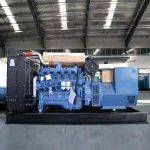Introduction
Diesel generators play a crucial role in providing backup power during emergencies, powering remote areas without access to the grid, and supporting industries that require continuous electricity supply. However, the efficiency of diesel generators has become a significant concern due to environmental impact, rising fuel costs, and the need for sustainable energy solutions. In this article, we will explore the importance of efficiency standards for diesel generators, the current landscape of regulations and guidelines, and how improving efficiency can benefit both users and the environment.
Importance of Efficiency Standards for Diesel Generators
Efficiency standards for diesel generators are essential for several reasons. Firstly, improving the efficiency of these generators can lead to significant cost savings for users. Diesel fuel is a major operating cost for diesel generators, and by increasing efficiency, users can reduce fuel consumption and lower their overall operating expenses.
Secondly, efficiency standards help reduce the environmental impact of diesel generators. Diesel engines are known for their high emissions of pollutants such as nitrogen oxides (NOx), particulate matter, and carbon dioxide (CO2). By improving efficiency and reducing fuel consumption, diesel generators can lower their emissions and contribute to a cleaner environment.
Thirdly, efficiency standards drive innovation and technology development in the diesel generator industry. Manufacturers are constantly striving to meet or exceed efficiency standards, leading to the development of more advanced and environmentally friendly generator systems.
Current Landscape of Efficiency Standards for Diesel Generators
Efficiency standards for diesel generators vary by region and are typically set by government agencies or international organizations. In the United States, the Environmental Protection Agency (EPA) sets emission standards for diesel engines, which indirectly impact the efficiency of diesel generators. The EPA's Tier 4 standards, for example, aim to reduce emissions of NOx and particulate matter by requiring the use of advanced emission control technologies.
In Europe, the European Union has established the Ecodesign Directive, which sets minimum energy efficiency requirements for a wide range of products, including diesel generators. The Ecodesign Directive aims to improve the environmental performance of products sold in the EU market by setting energy efficiency standards and labeling requirements.
Internationally, the International Organization for Standardization (ISO) has developed standards such as ISO 8528, which provides guidelines for the design, testing, and performance of generator sets. ISO 8528 includes requirements for fuel consumption, emissions, and efficiency, helping to ensure that diesel generators meet certain performance criteria.
Benefits of Improving Efficiency in Diesel Generators
Improving the efficiency of diesel generators offers a range of benefits for users, manufacturers, and the environment. Some of the key benefits include:
1. Cost Savings: By reducing fuel consumption, improving efficiency can lead to significant cost savings for users of diesel generators. Lower fuel costs translate to lower operating expenses and improved profitability for businesses that rely on backup power.
2. Environmental Impact: Diesel generators are a significant source of air pollution, contributing to smog, acid rain, and respiratory illnesses. Improving efficiency can help reduce emissions of pollutants such as NOx, particulate matter, and CO2, leading to a cleaner and healthier environment.
3. Reliability and Performance: Efficient diesel generators are more reliable and provide better performance during power outages or emergencies. By optimizing fuel consumption and reducing wear and tear on engine components, efficiency improvements can extend the lifespan of generator systems.
4. Regulatory Compliance: Meeting or exceeding efficiency standards for diesel generators ensures regulatory compliance and avoids potential fines or penalties for non-compliance. Adhering to standards also enhances the reputation of businesses as environmentally responsible and compliant with relevant regulations.
5. Technological Innovation: Improving efficiency drives technological innovation in the diesel generator industry, leading to the development of more advanced and sustainable generator systems. Manufacturers that invest in research and development to improve efficiency can gain a competitive edge in the market.
Strategies for Improving Efficiency in Diesel Generators
There are several strategies that users and manufacturers can employ to improve the efficiency of diesel generators. Some of the most effective strategies include:

1. Regular Maintenance: Proper maintenance is essential for ensuring the efficient operation of diesel generators. Regularly servicing and tuning up the engine, checking fuel filters and injectors, and monitoring oil levels can help optimize performance and fuel efficiency.
2. Load Management: Diesel generators are most efficient when operating at or near their rated load capacity. By managing loads effectively and avoiding underloading or overloading, users can optimize fuel consumption and improve overall efficiency.
3. Upgrading to Energy-Efficient Models: Upgrading to newer, energy-efficient diesel generator models can result in significant efficiency gains. Modern generators are equipped with advanced engine technologies, electronic controls, and fuel management systems that improve performance and reduce fuel consumption.
4. Hybrid Systems: Combining diesel generators with renewable energy sources such as solar panels or wind turbines can enhance overall system efficiency. Hybrid systems allow generators to operate intermittently or at lower loads, reducing fuel consumption and emissions.
5. Energy Storage: Implementing energy storage solutions such as batteries or supercapacitors can help improve the efficiency of diesel generators by storing excess energy for use during peak demand periods. Energy storage systems can also provide backup power without the need to run the generator continuously.
Conclusion
Efficiency standards for diesel generators are essential for improving performance, reducing environmental impact, and driving innovation in the industry. By focusing on strategies to improve efficiency, users and manufacturers can achieve cost savings, lower emissions, and enhance the reliability of diesel generator systems. 150kw diesel generator for remote off-grid locations in energy-efficient technologies and practices not only benefits individual users but also contributes to a more sustainable and resilient energy infrastructure globally. By working together to meet and exceed efficiency standards, we can create a cleaner, more efficient future powered by diesel generators.
